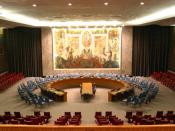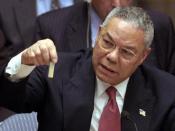Since 1945, the United Nations has been a platform for American negotiation and
action on key issues that remain on the U.N. agenda. The United States has employed the
U.N. as a setting to suggest new measures of human rights, challenge mistreatment of
women, promote democracy, and fight terrorism. The U.S. is able to instill influence in the U.N. because of their position as a permanent member of the security council of the U.N. and as the principle financial supporter of the United Nations.
The United Nation's Security Council is comprised of 15 members. There are five permanent members and ten members that are voted in and serve 2 year terms. As of
January 1, 2004 Algeria, Benin, Brazil, Philippines, and Romania began their two year terms. On December 31, 2004 Chile, Germany, Pakistan, Angola, and Spain's terms will end. The five permanent seats on the council belong to China, France, Russian Federation, United Kingdom, and the United States.
Each Council member has one vote. Decisions on procedural matters are made by an affirmative vote of at least nine of the fifteen members. Decisions on substantive matters require nine votes, including the concurring votes of all
five permanent members. This is the rule of "Great Power Unanimity", often referred to as the "veto" power."(1.) This council has a great deal of power. Under "U.N. Charter," all U.N. members are required to enforce the council's decision, while other departments of the United Nations may only make suggestions to other nations.
The United States is by far the principle financial supporter of the United Nations.
United States payments to the U.N. consisted of $897 million in 2003. Areas of American
funding are U.N. peacekeeping, U.N. Regular Budget, War Crime Tribunals, and Capital
Master Plan. The U.S. spends more than half their U.N.



Great loada info...
A lot of facts and figures, sounds about right... It's not an essay tho really... is it? Hey, dont get me wrong, its useful stuff I'm sure... but just doesn't seem to be going anywhere. Isn't all this stuff on the UN website?
Hey... hold on... did you just copy all this and paste it here... did ya... well...??
Hmmm...
0 out of 2 people found this comment useful.